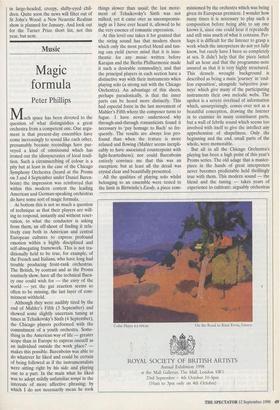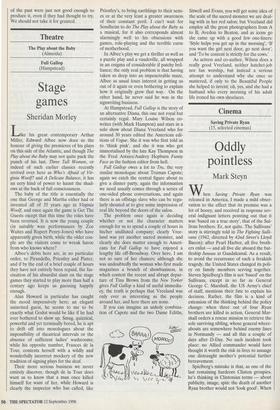Music
Magic formula
Peter Phillips
Much space has been devoted to the question of what distinguishes a great orchestra from a competent one. One argu- ment is that present-day ensembles have come increasingly to sound like each other, presumably because recordings have pur- veyed a kind of omnisound which has ironed out the idiosyncrasies of local tradi- tion. Such a circumscribing of colour is a pity but at least in the case of the Chicago Symphony Orchestra (heard at the Proms on 3 and 4 September under Daniel Baren- boim) the impression was reinforced that within this modern context the leading American and German-speaking orchestras do have some sort of magic formula.
At bottom this is not so much a question of technique as that their players are will- ing to respond, instantly and without reser- vation, to what the conductor is asking from them, an off-shoot of finding it rela- tively easy both in American and central European cultures to express profound emotion within a highly disciplined and self-abnegating framework. This is not tra- ditionally held to be true, for example, of the French and Italians, who have long had trouble producing front-rank orchestras. The British, by contrast and as the Proms routinely show, have all the technical fluen- cy one could wish for — the envy of the world — yet the gut reaction seems so often to be missing, the last layer of com- mitment withheld.
Although they were audibly tired by the end of Mahler's Fifth (3 September) and showed some slightly uncertain tuning at times in Tchaikovslcy's Sixth (4 September), the Chicago players performed with the commitment of a youth orchestra. Some- thing in the American way of life — greater scope than in Europe to express oneself as an individual outside the work place? — makes this possible. Barenboim was able to do whatever he liked and could be certain of being followed as if the instrumentalists were sitting right by his side and playing one to a part. In the main what he liked was to adopt mildly unfamiliar tempi in the interests of more affective phrasing; by which I do not necessarily mean he took things slower than usual; the last move- ment of Tchaikovsky's Sixth was not milked, yet it came otrer as uncompromis- ingly as I have ever heard it, allowed to be the very essence of romantic expression.
At this level one takes it for granted that the string sound has that modern sheen which only the most perfect blend and tun- ing can yield (never mind that it is inau- thentic for any music written before Karajan and the Berlin Philharmonic made it such a desirable commodity); and that the principal players in each section have a distinctive way with their instruments when playing solo (a strong suit with the Chicago Orchestra). An advantage of this sheen, perhaps paradoxically, is that the inner parts can be heard more distinctly. This had especial force in the last movement of Mahler's Fifth where the composer turns to fugue. I have never understood why through-and-through romanticists found it necessary to 'pay homage to Bach' so fre- quently. The results are always less pro- found than when the texture is more relaxed and flowing (Mahler seems inexpli- cably to have associated counterpoint with light-heartedness); nor could Barenboim entirely convince me that this was an exception; but at least all the detail was crystal clear and beautifully presented.
All the qualities of playing solo whilst belonging to an ensemble were tested to the limit in Birtwistle's Exody, a piece com- missioned by the orchestra which was being given its European premiere. I wonder how many times it is necessary to play such a composition before being able to say one knows it, since one could hear it repeatedly and still miss much of what it contains. Per- haps it is difficult for the listener to grasp a work which the interpreters do not yet fully know, but rarely have I been so completely at sea. It didn't help that the piece lasted half an hour and that the programme-note assured us that it is very highly structured. This densely wrought background is described as being a main 'journey' in 'end- less exposition', alongside 'subjective jour- neys' which give many of the participating instruments their own melodic webs. The upshot is a severe overload of information which, unsurprisingly, comes over not as a beautiful conception, drawing the listener in to examine its many constituent parts, but a wall of febrile sound which seems too involved with itself to give the intellect any apprehension of shapeliness. Only the beginning and the end, small parts of the whole, were memorable.
But all in all the Chicago Orchestra's playing has been a high point of this year's Proms series. The old adage that a master- piece in the hands of great interpreters never becomes predictable held thrillingly true with them. This modern sound — the blend and the tuning — takes years of experience to cultivate: arguably orchestras of the past were just not good enough to produce it, even if they had thought to try. We should not take it for granted.



































































 Previous page
Previous page